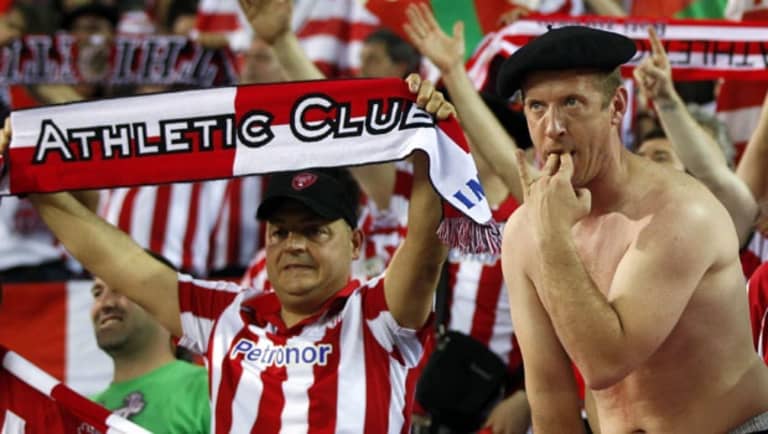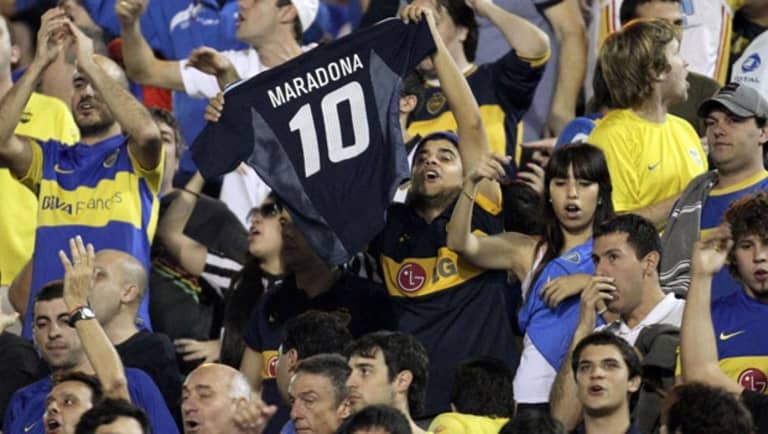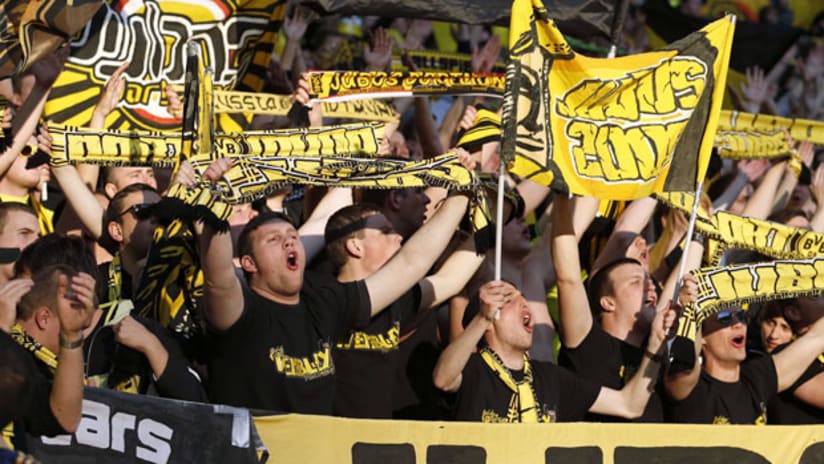There are billions of devoted soccer fans around the world, but some of them have an even deeper connection to their beloved clubs: They own them.
Fan ownership takes on many different forms according to the laws and culture of the countries in question, but at its core it is meant to empower and include supporters whose passion fuels the whole undertaking.
In honor of this week's installment of The Word, in which MLSsoccer.com managing editor Jonah Freedman peeks inside Nashville FC – America's first supporter-created and owned NPSL club making waves in the U.S. Soccer scene – here's our take on the world's most remarkable fan-owned clubs:
5) Portsmouth FC, England – The seaside club once “lived the dream” at the top of English soccer, competing well in the Premier League and winning the 2008 FA Cup thanks to star players (including current Toronto FC striker Jermain Defoe) purchased by wealthy chairman Milan Mandaric – one of the founders of the original San Jose Earthquakes in 1974.
But a revolving door of foreign owners led to upheaval and financial ruin as the global economy hit the skids in 2008, and “Pompey” slid into bankruptcy twice and were relegated three times in four years. With PFC's extinction looming, the Portsmouth Supporters' Trust raised funds and brokered a deal with the club's creditors and previous owner to take control and exit bankruptcy.
Now competing in League Two, they are the largest fan-owned team in England and seek to climb back up the pyramid while redeveloping the area around Pompey's venerable home ground, Fratton Park.
Portsmouth have even been in informal discussions with Nashville FC about some sort of partnership with their supporter-owned cousins across the pond. Nashville FC president Chris Jones tells MLSsoccer.com that the nature of collaboration discussed has ranged from small potatoes like cross-promoting on both clubs' websites, to big ideas like one day loaning players between them.

4) Athletic Bilbao, Spain
– A true outlier in world football since 1898. More than 33,000 members are eligible to vote in regular elections for club leadership positions – and their most important policy is a sacred pillar of both Athletic's identity and that of the Basque region they call home: the “cantera” philosophy, which requires that only players of Basque heritage may appear in their iconic red-and-white striped kits.
The policy limits the available talent pool, but creates a powerful collective identity. In fact, the Basque club is one of a select few which have never been relegated from La Liga, Spain's top flight. And pride in the cantera ethos is so strong that fans have repeatedly expressed that they would prefer relegation to abandonment of their homegrown ways.
The club's website says it best: “Athletic Club as an institution, along with its supporters, are characterized by their desire to defend values which are becoming increasingly uncommon in football and in sports overall in the 21st century.”
3) FC Barcelona, Spain – They're far wealthier and more widely supported than their Basque counterparts. But as the de facto national team for the Catalan region, the Blaugrana occupy just as central a place in their local community – they just happen to have exported the alluring magic of “The Barça Way” worldwide.
As in Bilbao, FCB are owned by their nearly 200,000 individual members, or socios, who vote in club elections and help fill the 98,787-capacity Camp Nou stadium, one of the game's true cathedrals. The team is also powered by its penyes, or supporters' clubs, which number some 1,200 and can be found around the world, earning Barça the tag “Més que un club” (More than a club).
Penyes fueled Camp Nou's original construction and helped the club survive during the dark days following the Spanish Civil War, when military dictator Francisco Franco – a staunch fan of hated rivals Real Madrid – made life difficult for FCB and Catalonia as a whole.

2) Boca Juniors, Argentina
– The pride of Buenos Aires, Boca are a South American powerhouse and a case study in fan power. Founded by five young Italian immigrants in the blue-collar neighborhood of La Boca in 1905 and still 100 percent supporter-owned today, “
Los Xeneizes
” are deeply connected with a working-class identity and the sentimental choice of fans across Latin America.
They consider themselves the favorite club of “la mitad más uno,” or “half plus one” of the Argentinean population and surveys suggest that this is only a slight exaggeration.
At Boca, “the 12th man” is not just a catchphrase, but a nearly century-old pillar of club tradition as well as the name of the team's main supporter's group, La 12, a passionate crew often linked to hooliganism as well as a powerful voice in the inner workings of club management.
1) Borussia Dortmund, Germany – Their rivals Bayern Munich are also contenders for this spot – the Bundesliga effectively requires its clubs to be majority-owned by their fans, and Bayern are 81.8 percent controlled by more than 200,000 members.
But the populist spirit of German soccer shines brightest at Signal Iduna Park, where Dortmund are cheered on by home crowds routinely topping 80,000 and the loudest – and youngest – fans pay less than $20 a game to pack into the standing-room south end section known as the “Yellow Wall.”
After overspending and waning results on the field combined to push Dortmund to the brink of insolvency a decade ago, smart leadership and a grassroots-oriented player development philosophy brought the club roaring back and now their bright gold jerseys symbolize not just quality soccer, but an egalitarian community spirit.
“This is our German football culture: to have standing, and cheap tickets, and the clubs controlled by their members," chief executive Hans-Joachim Watzke told The Guardian in 2012. “We want everybody to feel it is their club and that is really important. I was a supporter standing for 20 years, I know what it is to stand there, the feeling, the discussions you have there. In Germany, we are a little bit romantic.”











